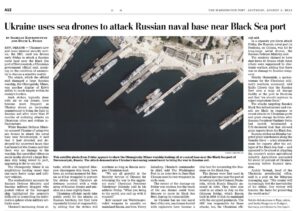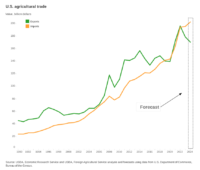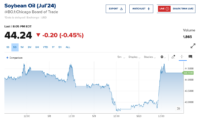Bloomberg's Clarice Couto reported this past Friday that "a surprising tax change in agriculture powerhouse Brazil has the potential to make soy grown in the world’s largest bean exporter less…
Threat of Violence in the Black Sea Expands
Financial Times writer Christopher Miller reported on Saturday that, “A Ukrainian naval drone has struck a Russian oil tanker in the Kerch Strait near Crimea, in the latest in a series of bold strikes that signal Kyiv’s use of unmanned vehicles is becoming more aggressive and effective.
“The attack on the vessel took place early on Saturday morning according to Russian reports and a Ukrainian official with knowledge of the operation.
“It was the second attack on a Russian vessel in 24 hours, after Friday’s damage to a naval ship outside the Black Sea port of Novorossiysk, and came shortly before Kyiv warned that all Russian Black Sea ports would become areas of ‘war risk.'”
New York Times writers Marc Santora and Christiaan Triebert reported on Saturday that, “A Ukrainian maritime drone packed with explosives rammed into a Russian oil tanker early Saturday off the eastern coast of occupied Crimea, Russian officials and a Ukrainian official said, the second strike on a Russian ship at sea in two days.
“That attack coincided with a new directive from Ukraine’s maritime authority, dated Friday, warning that six Russian Black Sea ports and the approaches to them would be considered ‘war risk’ areas until further notice. The notice expanded on a less specific warning last month that any vessels sailing to ports in Russia or occupied Ukraine would be considered military targets.
Taken together, the tanker attack — which occurred in the Kerch Strait near a critical bridge connecting Russia and the Crimean peninsula — and Kyiv’s new directive have ratcheted up the threat of expanded violence in the Black Sea.
“Tensions had already been stoked by Russia’s sustained aerial assault on Ukraine’s ports since Moscow decided last month to withdraw from a U.N.-brokered deal allowing Ukrainian grain exports.”

Associated Press writer Hanna Arhirova reported in Sunday’s Los Angeles Times that,
As Kyiv’s naval capabilities grow, the Black Sea is becoming an increasingly important battleground in Ukraine’s fight against Russia, which invaded its neighbor early last year.
“Three weeks ago, Moscow withdrew from a key export agreement that allowed Ukraine to ship millions of tons of grain across the Black Sea for sale on world markets. In the wake of that withdrawal, Russia carried out repeated strikes on Ukrainian ports, including Odesa.”
Since 1991, russia has systematically used the territorial waters of Ukraine to organize armed aggressions: against the Georgian people and against the people of Syria. Today, they terrorize peaceful Ukrainian cities and destroy grain condemning hundreds of millions to…
— Defense of Ukraine (@DefenceU) August 5, 2023
The AP article noted that, “Ukraine’s earlier strike on Novorossiysk halted maritime traffic for a few hours and marked the first time a commercial Russian port has been targeted in the nearly 18-month-old conflict. The port has a naval base, shipbuilding yards and an oil terminal, and is key for exports. It lies about 60 miles east of Crimea.
“Shipping expert Jayendu Krishna told the Associated Press that the attacks left Russian shipping activity ‘largely unaffected.’ He believes that they may increase the risk of Russian attacks on Ukrainian ports rather than serving as a tool to put pressure on Russia to halt attacks and reinstate the grain deal.”

Elsewhere, Isabelle Khurshudyan and David L. Stern reported in Saturday’s Washington Post that, “The attacks targeting Russia’s Black Sea infrastructure and vessels are likely in response to recent attacks on Ukrainian ports and grain storage facilities after Russian President Vladimir Putin last month terminated a United Nations-brokered deal that allowed grain exports from the Black Sea.
“Russian strikes on Monday targeted grain warehouses along the Danube River — a key alternative route for exports after the collapse of the Black Sea deal — and appeared to be aimed at crippling the country’s entire agricultural industry. Agriculture accounted for about 20 percent of Ukraine’s economy before Russia’s invasion.”
And New York Times writer Vivek Shankar reported on Sunday that, “Ukrainian strikes on Russian ships in the Black Sea. Waves of drones fired on Moscow. A Russian attack on a Ukrainian port on the Danube river near the Romanian border. With these strikes, both sides have opened a new dimension to the 17-month-old war, which until now had largely been fought in grinding battles in Ukraine.
“And they are taking the war to people and areas that may have been spared the brunt of the fighting. For Ukraine, the increasingly bolder attacks are part of a stated objective to try to force ordinary Russians to reckon with the toll of the war. For Russia, which in recent weeks also has increasingly targeted the Black Sea port of Odesa, it is part of a campaign to expand attacks on Kyiv’s ability to export its agricultural products, a vital part of Ukraine’s economy.”
On Friday, Reuters writer Christopher Walljasper reported that, “Disruption of Russian shipments through the Black Sea, in addition to already curtailed Ukrainian exports, could unsettle the wheat market, traders said, but like after recent Russian strikes against Ukrainian grain ports, participants were assessing the actual impact on export markets.”







